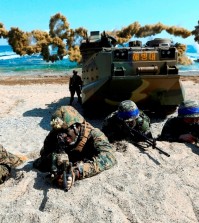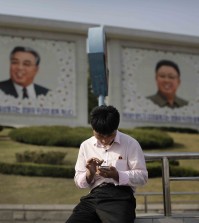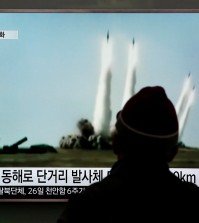- California Assembly OKs highest minimum wage in nation
- S. Korea unveils first graphic cigarette warnings
- US joins with South Korea, Japan in bid to deter North Korea
- LPGA golfer Chun In-gee finally back in action
- S. Korea won’t be top seed in final World Cup qualification round
- US men’s soccer misses 2nd straight Olympics
- US back on track in qualifying with 4-0 win over Guatemala
- High-intensity workout injuries spawn cottage industry
- CDC expands range of Zika mosquitoes into parts of Northeast
- Who knew? ‘The Walking Dead’ is helping families connect
N. Korea fires two ballistic missiles
By Kang Seung-woo
North Korea launched two mid-range missiles into the East Sea, Wednesday.
The launches came as leaders of Korea, Japan and the United States held a summit to deal with challenges presented by Pyongyang’s nuclear ambitions. U.S. President Barack Obama earlier turned down a suggestion by Chinese President Xi Jinping for a resumption of the six-party talks with the North.
According to the Ministry of National Defense, North Korea launched two Rodong ballistic missiles at 2:35 a.m. and 2:42 a.m. They flew about 650 kilometers and landed within 10 kilometers of Japan’s air defense identification zone.
The missile test also came on the fourth anniversary of the sinking of South Korea’s naval ship Cheonan in a North Korean torpedo attack that killed 46 sailors.
“North Korea’s ballistic missile launch clearly violates U.N. security resolutions and is a grave provocation to South Korea and the international community,” ministry spokesman Kim Min-seok said at a briefing. ‘”We strongly urge the North to stop these provocative acts.”
This was the first time since 2009 that the North has launched Rodong missiles, which can fly 1,300 kilometers and are capable of reaching most parts of Japan. The North test-fired the missile in July 2006 and 2009.
The spokesman said that the test this time is attributable to the three-way summit as well as ongoing joint military exercises being staged by the U.S. and South Korea.
President Park Geun-hye, Japanese Prime Minister Shinzo Abe and Obama stressed the need to denuclearize the North during their summit on the sidelines of the Nuclear Security Summit in The Hague, Netherlands.
The foreign ministry condemned the missile launches, calling them “serious threats to international navigation activities and civilian safety.”
The U.S. State Department described the ballistic missiles as “a troubling and provocative escalation.”
“We urge North Korea to exercise restraint and refrain from further threatening actions,” State Department deputy spokeswoman Marie Harf said.
“We are closely coordinating with our allies and partners, including in the U.N. Security Council, to take the appropriate measures in response to this latest provocation and to address the threat to global security posed by North Korea’s nuclear and ballistic missile programs.”
Meanwhile, the commander of the U.S. Forces Korea (USFK) said that a partial reason for the missile launches was likely regular training.
But they were primarily designed as “demonstrations, both for the (Kim Jong-un) regime and for the people of its capability,” Gen. Curtis Scaparrotti said at a U.S. congressional hearing.
He added that North Korean leaders intended to demonstrate to the U.S. and South Korea what they are capable of doing “on short notice, with very little warning.”















